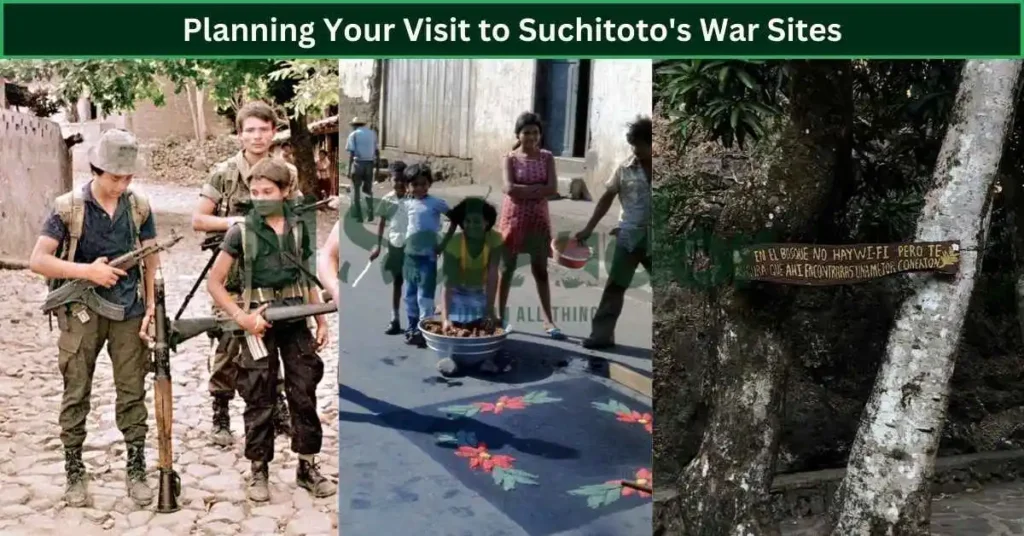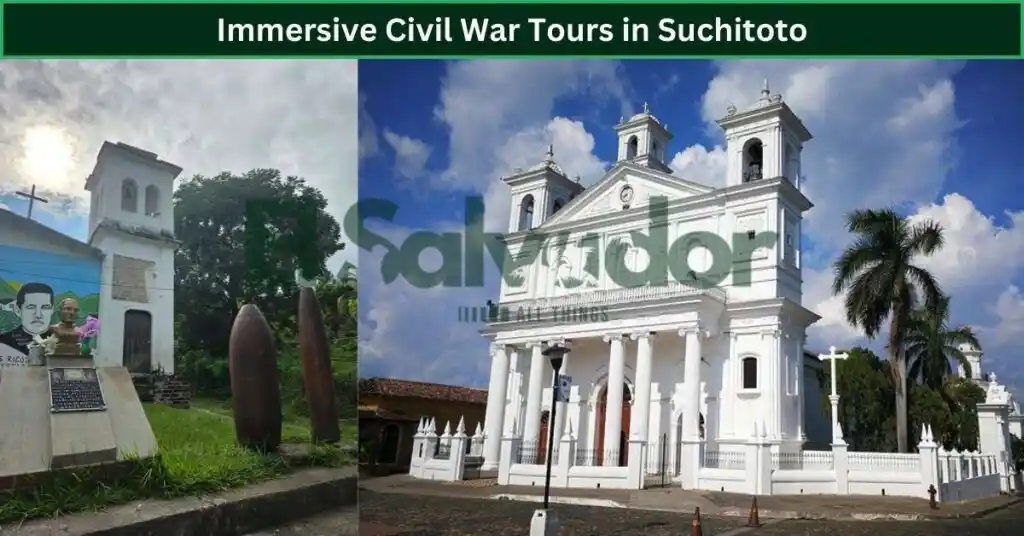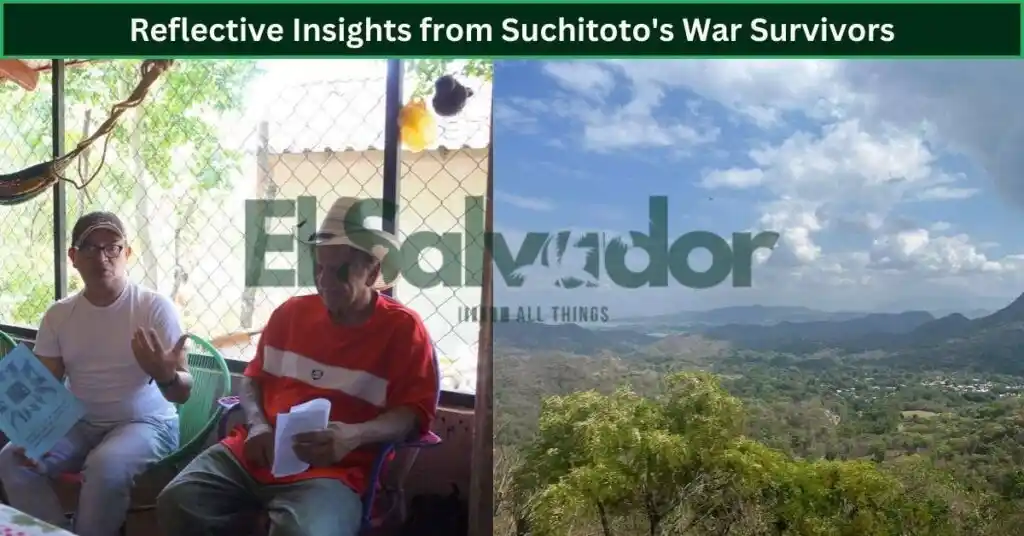Step Into History: Salvadoran Civil War Tour
Suchitoto, a beautiful town in El Salvador, holds a deep history marked by the echoes of its past conflicts. During the Salvadoran Civil War, this place was at the heart of many struggles. Today, it invites visitors to look back and understand the significant impacts of those times.
- Historic Town with a Story: Suchitoto is more than just a town; it’s a witness to history. The streets and buildings tell stories of a time when they were battlegrounds.
- Preserved Sites: Many sites around Suchitoto have been preserved to help people remember and learn about the civil war. These places include old buildings with bullet holes and areas where important battles took place.
- Cultural Hub: Despite its war-torn past, Suchitoto has become a center for culture and arts. The town celebrates its recovery and resilience through various festivals and events that draw visitors from around the world.
Visiting Suchitoto offers a unique chance to connect with the past and see how history has shaped the present. It’s a journey through time that highlights both the challenges and the triumphs of a community that refused to give up. Let us be your guide to all things El Salvador.
Key Takeaways
- Suchitoto is a historic town deeply shaped by the Salvadoran Civil War, with preserved sites, buildings, and landmarks that still reflect the conflict.
- The town played a strategic military and cultural role, serving as both a battleground and a hub for artistic resistance during the war.
- Visitors can explore immersive civil war tours, including guided walks through battlefields, preserved structures, and storytelling by expert local historians.
- Interactive experiences such as meeting veterans and locals provide personal, emotional insights into life during the conflict and the community’s recovery.
- Survivor stories highlight resilience, unity, and rebuilding, offering powerful lessons on forgiveness and peace.
- Suchitoto today thrives as a cultural and artistic center, showing how the town transformed its painful past into a vibrant present.
- Planning tips include visiting during the dry season, choosing respectful behavior, and considering guided tours for deeper understanding.
Understanding Suchitoto’s Role in the Salvadoran Civil War
Suchitoto played a crucial role during the Salvadoran Civil War, serving as a strategic site for both military and cultural reasons. Here’s how Suchitoto was involved:
- Strategic Location: Located near the capital city, Suchitoto was key for controlling regional routes. Both sides of the war saw its value, leading to many conflicts within the town.
- Cultural Resistance: Amidst the violence, Suchitoto became a place where artists and thinkers gathered. They used art and culture as forms of resistance, promoting peace and expressing the harsh realities of war.
- Community Impact: The war deeply affected the local community. Many residents were involved directly in the conflict, and the town suffered significant damage and loss of life.
Understanding Suchitoto’s role in the civil war helps visitors appreciate the depth of its history and the resilience of its people. The town’s past has shaped its present identity as a symbol of peace and cultural richness.
Planning Your Visit to Suchitoto’s War Sites
Visiting the war sites in Suchitoto offers a profound insight into the history and the resilience of its people. Here’s how to plan your visit effectively:
How to Prepare for a Historical Tour
- Research: Before you go, read up on Suchitoto’s history during the civil war. Understanding the background will make your visit more meaningful.
- Guided Tours: Consider booking a guided tour. Local guides can provide deeper insights and share stories that you won’t find in books.
- What to Bring: Wear comfortable walking shoes as you’ll be exploring old sites. Also, bring water, sunscreen, and a hat to protect against the sun.
- Respectful Behavior: Remember, these sites are part of a painful history for many. Be respectful by keeping noise to a minimum and following any guidelines provided at the sites.
Best Times to Visit for a Tour Experience
- Dry Season: Visit during the dry season from November to April when the weather is more pleasant, making it easier to walk through the historical sites.
- Early Morning or Late Afternoon: These times are cooler and less crowded. You’ll get a better chance to explore the sites in peace and take your time through the tours.
- Cultural Events: Check for any local festivals or commemorative events that might coincide with your visit. These can enhance your experience with live performances and exhibitions related to the town’s history.
Planning your visit carefully will help you have a more educational and respectful experience while exploring Suchitoto’s war sites.

Immersive Civil War Tours in Suchitoto
Suchitoto offers immersive tours that allow visitors to step back in time and experience the history of the Salvadoran Civil War first-hand. These tours are designed to educate and engage tourists by connecting them with the town’s storied past.
Guided Walks Through Battlefields and Historical Sites
- Explore Key Locations: Tour guides take visitors through significant battlefields, buildings, and landmarks that played crucial roles during the civil war.
- Learn from Experts: Local historians and guides provide detailed narratives of the events that unfolded in each location, offering insights not found in textbooks.
- Visual Aids: Some tours include photographs, maps, and other visual aids to help visitors visualize the past events and understand the strategic importance of Suchitoto during the war.
Interactive Experiences: Meeting Veterans and Locals
- Veteran Stories: Some tours offer the unique opportunity to meet war veterans who share personal stories and experiences from the civil war, giving a human face to the historical facts.
- Local Interactions: Visitors can also engage with local residents who lived through the war. These interactions provide a deeply personal perspective on the impact of the conflict on daily life and the community’s recovery.
- Cultural Exchange: These meetings are not only educational but also foster a cultural exchange, allowing visitors to understand the enduring spirit and resilience of the Suchitoto community.
These immersive tours in Suchitoto not only educate visitors about the civil war but also connect them emotionally to the stories of those who lived through it, enhancing their understanding of the conflict’s impact on today’s Suchitoto.

Reflective Insights from Suchitoto’s War Survivors
Suchitoto’s history is not just about the battles and conflicts but also about the incredible resilience and recovery of its people. Hearing from the war survivors themselves offers profound insights into both the pain of the past and the peace that has since been achieved.
Stories of Resilience and Recovery
- Personal Narratives: Survivors share their personal stories, which include tales of survival, heroism, and sometimes loss. These narratives highlight the human spirit and the will to persevere through incredibly challenging times.
- Community Efforts: Learn about how the community came together to rebuild their town and lives after the war. Initiatives like rebuilding homes, revitalizing cultural practices, and restoring peace are central themes.
- Lessons Learned: These stories often include important lessons on forgiveness, the importance of community, and the strength found in unity, which helped them overcome the adversities of war.

The Impact of Peace on Suchitoto Today
- Cultural Renaissance: Since the end of the civil war, Suchitoto has experienced a cultural renaissance, with arts and culture playing pivotal roles in healing and bringing people together.
- Economic Growth: Peace has also paved the way for economic development. Tourism, driven by the town’s rich history and cultural offerings, has become a significant part of Suchitoto’s economy.
- Preservation of History: The commitment to peace is evident in the efforts to preserve historical sites and educate future generations. This not only honors those who suffered during the civil war but also teaches the value of peace.
Reflecting on these insights provides visitors with a deeper understanding of the cost of war and the priceless value of peace, as seen through the eyes of those who lived through Suchitoto’s darkest and brightest days.
Planning Your Trip: This 1-week El Salvador itinerary is your perfect guide to experiencing the country’s top highlights—combining adventure, culture, and relaxation into one unforgettable week.
People Shared their Experiences on Different Community Forums
I came across an AMA thread where a 52-year-old survivor of El Salvador’s civil war in the 1980s shared their experiences and answered questions. Originally from San Salvador, they immigrated to the United States at 18.
Participants in the thread asked about the accuracy of historical accounts, personal experiences with human rights violations, the impact of foreign involvement on local conditions, comparisons to current events in other countries, and personal sentiments about emigration and past life in El Salvador.
The survivor shared that despite close encounters with violence, their experience was less traumatic than many others. The thread also touched on topics like the atmosphere after assassinations and the U.S.’s role during the war.
More Guides from All Things El Salvador For Travelers
- Malacatiupan Hot Waterfalls El Salvador: Natural thermal waterfall escape
- Bitcoin in El Salvador: First country to adopt Bitcoin
- El Salvador Beaches: Surf, sun, and scenic shores
- What to Do in San Miguel: Top attractions in eastern El Salvador
About Author
Hi, I’m Diana Alferez, a proud Salvadoran passionate about helping travelers discover the true beauty and culture of my country.
At All Things El Salvador, we provide accurate guides, practical tips, and fresh insights from both locals and adventurers, helping you explore confidently while breaking outdated perceptions of this incredible destination.

